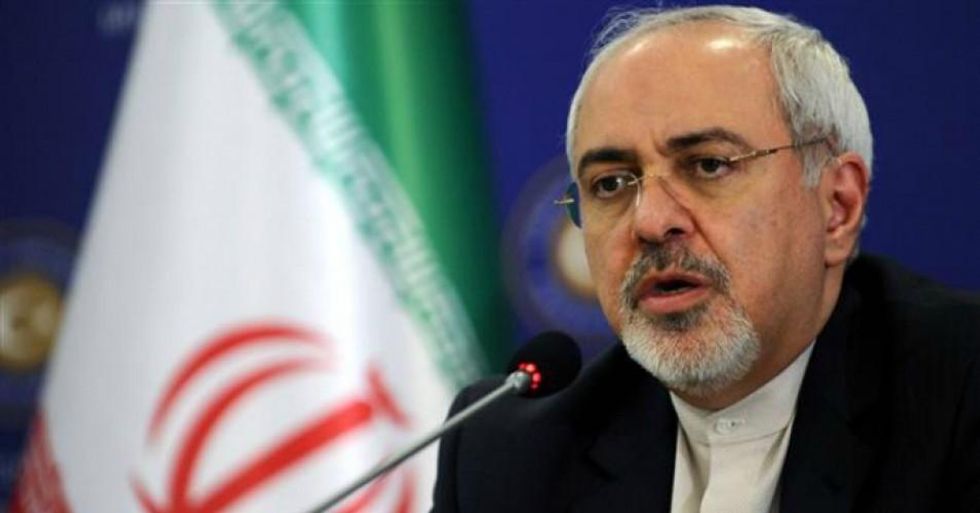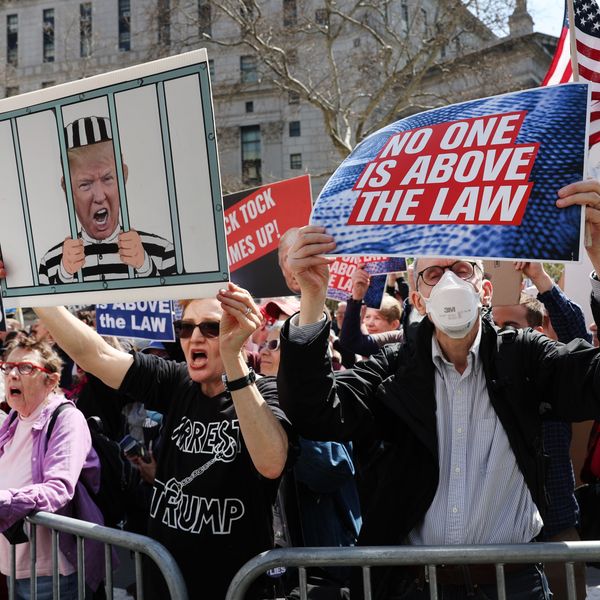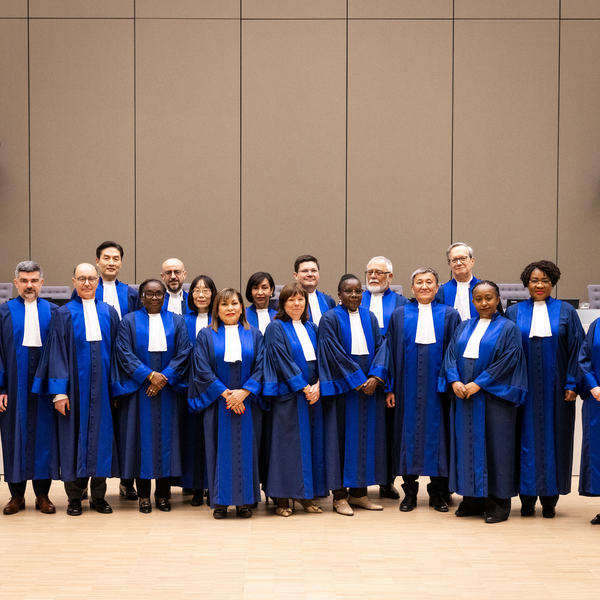Accusing Trump of 'Naked Economic Aggression,' Iran Urges UN High Court to Halt US Sanctions
"The U.S. is publicly propagating a policy intended to damage as severely as possible Iran's economy and Iranian national companies, and therefore inevitably Iranian nationals."

Amid reports of the "devastating" impact U.S. President Donald Trump's newly reimposed sanctions are having on ordinary Iranians' ability to afford basic necessities and life-saving medicines, Iran accused the U.S. of "naked economic aggression" before the International Court of Justice (ICJ) on Monday and called on the United Nations body to order a suspension of the penalties.
"Sanctions hurt ordinary people on the streets and do not inflict pain at all whatsoever on the government. How is withholding chemotherapy from my 80-year-old grandmother helpful?"
--Meisam, Iranian-American doctor "The U.S. is publicly propagating a policy intended to damage as severely as possible Iran's economy and Iranian national companies, and therefore inevitably Iranian nationals," Mohsen Mohebi, a lawyer representing Iran before the U.N.'s highest court, declared on Monday, arguing that Trump's sanctions violate the bilateral Treaty of Amity. "This policy is nothing but a naked economic aggression against my country. Iran will put up the strongest resistance to the U.S. economic strangulation, by all peaceful means."
As Common Dreams reported, critics warned that Trump's decision to violate the Iran nuclear accord and reimpose sanctions--which officially went into effect earlier this month--significantly heighten the risk of a "new war in the Middle East."
The trade penalties are just one component of the Trump administration's broader push to "foment unrest" in Iran, an effort that critics have condemned as a thinly veiled push for regime change.
In an interview on Sunday, Iranian Foreign Minister Javad Zarif accused the Trump administration of waging a "psychological war against Iran."
Iran's legal case against the U.S. sanctions comes as ordinary Iranians report being unable to access crucial medicines as a result of the Trump administration's so-called pressure campaign.
"Sanctions hurt ordinary people on the streets and do not inflict pain at all whatsoever on the government," Meisam, an Iranian-American doctor whose grandmother has been unable to access her chemotherapy medicine because of the new restrictions, told The Independent. "How is withholding chemotherapy from my 80-year-old grandmother helpful to anyone's objective?"
\u201cThe lives being affected by #Iran sanctions are not the regime, they're ordinary people worrying for their families, lacking necessities like medicine. #SanctionedLives https://t.co/WNfScQDTTC\u201d— NIAC (@NIAC) 1535209202
Bolstering Iran's case that the Trump administration's sanctions are legally dubious as well as deeply harmful to ordinary Iranians, U.N. Special Rapporteur Idriss Jazairy said in a scathing statement last week that the trade penalties are illegitimate and "unjust."
"International sanctions must have a lawful purpose, must be proportional, and must not harm the human rights of ordinary citizens, and none of these criteria is met in this case," Jazairy argued. "These unjust and harmful sanctions are destroying the economy and currency of Iran, driving millions of people into poverty and making imported goods unaffordable."
An Urgent Message From Our Co-Founder
Dear Common Dreams reader, The U.S. is on a fast track to authoritarianism like nothing I've ever seen. Meanwhile, corporate news outlets are utterly capitulating to Trump, twisting their coverage to avoid drawing his ire while lining up to stuff cash in his pockets. That's why I believe that Common Dreams is doing the best and most consequential reporting that we've ever done. Our small but mighty team is a progressive reporting powerhouse, covering the news every day that the corporate media never will. Our mission has always been simple: To inform. To inspire. And to ignite change for the common good. Now here's the key piece that I want all our readers to understand: None of this would be possible without your financial support. That's not just some fundraising cliche. It's the absolute and literal truth. We don't accept corporate advertising and never will. We don't have a paywall because we don't think people should be blocked from critical news based on their ability to pay. Everything we do is funded by the donations of readers like you. Will you donate now to help power the nonprofit, independent reporting of Common Dreams? Thank you for being a vital member of our community. Together, we can keep independent journalism alive when it’s needed most. - Craig Brown, Co-founder |

Amid reports of the "devastating" impact U.S. President Donald Trump's newly reimposed sanctions are having on ordinary Iranians' ability to afford basic necessities and life-saving medicines, Iran accused the U.S. of "naked economic aggression" before the International Court of Justice (ICJ) on Monday and called on the United Nations body to order a suspension of the penalties.
"Sanctions hurt ordinary people on the streets and do not inflict pain at all whatsoever on the government. How is withholding chemotherapy from my 80-year-old grandmother helpful?"
--Meisam, Iranian-American doctor "The U.S. is publicly propagating a policy intended to damage as severely as possible Iran's economy and Iranian national companies, and therefore inevitably Iranian nationals," Mohsen Mohebi, a lawyer representing Iran before the U.N.'s highest court, declared on Monday, arguing that Trump's sanctions violate the bilateral Treaty of Amity. "This policy is nothing but a naked economic aggression against my country. Iran will put up the strongest resistance to the U.S. economic strangulation, by all peaceful means."
As Common Dreams reported, critics warned that Trump's decision to violate the Iran nuclear accord and reimpose sanctions--which officially went into effect earlier this month--significantly heighten the risk of a "new war in the Middle East."
The trade penalties are just one component of the Trump administration's broader push to "foment unrest" in Iran, an effort that critics have condemned as a thinly veiled push for regime change.
In an interview on Sunday, Iranian Foreign Minister Javad Zarif accused the Trump administration of waging a "psychological war against Iran."
Iran's legal case against the U.S. sanctions comes as ordinary Iranians report being unable to access crucial medicines as a result of the Trump administration's so-called pressure campaign.
"Sanctions hurt ordinary people on the streets and do not inflict pain at all whatsoever on the government," Meisam, an Iranian-American doctor whose grandmother has been unable to access her chemotherapy medicine because of the new restrictions, told The Independent. "How is withholding chemotherapy from my 80-year-old grandmother helpful to anyone's objective?"
\u201cThe lives being affected by #Iran sanctions are not the regime, they're ordinary people worrying for their families, lacking necessities like medicine. #SanctionedLives https://t.co/WNfScQDTTC\u201d— NIAC (@NIAC) 1535209202
Bolstering Iran's case that the Trump administration's sanctions are legally dubious as well as deeply harmful to ordinary Iranians, U.N. Special Rapporteur Idriss Jazairy said in a scathing statement last week that the trade penalties are illegitimate and "unjust."
"International sanctions must have a lawful purpose, must be proportional, and must not harm the human rights of ordinary citizens, and none of these criteria is met in this case," Jazairy argued. "These unjust and harmful sanctions are destroying the economy and currency of Iran, driving millions of people into poverty and making imported goods unaffordable."

Amid reports of the "devastating" impact U.S. President Donald Trump's newly reimposed sanctions are having on ordinary Iranians' ability to afford basic necessities and life-saving medicines, Iran accused the U.S. of "naked economic aggression" before the International Court of Justice (ICJ) on Monday and called on the United Nations body to order a suspension of the penalties.
"Sanctions hurt ordinary people on the streets and do not inflict pain at all whatsoever on the government. How is withholding chemotherapy from my 80-year-old grandmother helpful?"
--Meisam, Iranian-American doctor "The U.S. is publicly propagating a policy intended to damage as severely as possible Iran's economy and Iranian national companies, and therefore inevitably Iranian nationals," Mohsen Mohebi, a lawyer representing Iran before the U.N.'s highest court, declared on Monday, arguing that Trump's sanctions violate the bilateral Treaty of Amity. "This policy is nothing but a naked economic aggression against my country. Iran will put up the strongest resistance to the U.S. economic strangulation, by all peaceful means."
As Common Dreams reported, critics warned that Trump's decision to violate the Iran nuclear accord and reimpose sanctions--which officially went into effect earlier this month--significantly heighten the risk of a "new war in the Middle East."
The trade penalties are just one component of the Trump administration's broader push to "foment unrest" in Iran, an effort that critics have condemned as a thinly veiled push for regime change.
In an interview on Sunday, Iranian Foreign Minister Javad Zarif accused the Trump administration of waging a "psychological war against Iran."
Iran's legal case against the U.S. sanctions comes as ordinary Iranians report being unable to access crucial medicines as a result of the Trump administration's so-called pressure campaign.
"Sanctions hurt ordinary people on the streets and do not inflict pain at all whatsoever on the government," Meisam, an Iranian-American doctor whose grandmother has been unable to access her chemotherapy medicine because of the new restrictions, told The Independent. "How is withholding chemotherapy from my 80-year-old grandmother helpful to anyone's objective?"
\u201cThe lives being affected by #Iran sanctions are not the regime, they're ordinary people worrying for their families, lacking necessities like medicine. #SanctionedLives https://t.co/WNfScQDTTC\u201d— NIAC (@NIAC) 1535209202
Bolstering Iran's case that the Trump administration's sanctions are legally dubious as well as deeply harmful to ordinary Iranians, U.N. Special Rapporteur Idriss Jazairy said in a scathing statement last week that the trade penalties are illegitimate and "unjust."
"International sanctions must have a lawful purpose, must be proportional, and must not harm the human rights of ordinary citizens, and none of these criteria is met in this case," Jazairy argued. "These unjust and harmful sanctions are destroying the economy and currency of Iran, driving millions of people into poverty and making imported goods unaffordable."

